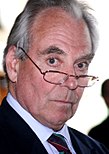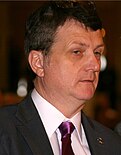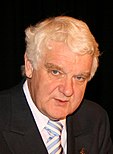UK Independence Party leadership election, 2009

|
|||||||||||||||||||||||||||||||||
|---|---|---|---|---|---|---|---|---|---|---|---|---|---|---|---|---|---|---|---|---|---|---|---|---|---|---|---|---|---|---|---|---|---|
|
|||||||||||||||||||||||||||||||||
|
|||||||||||||||||||||||||||||||||
|
|||||||||||||||||||||||||||||||||
The United Kingdom Independence Party (UKIP) held a leadership election in 2009, with ballots closing on 26 November. The election was won by Malcolm Pearson, Baron Pearson of Rannoch.
The Eurosceptic party had been led by Nigel Farage since he won the 2006 leadership election. He announced his resignation from the post in September 2009, stating that he wanted to devote more time to his campaign for a seat in the United Kingdom House of Commons.
There were five candidates for the election.
Gerard Batten was a Member of the European Parliament (MEP) and stood unsuccessfully in the London mayoral election, 2008. His main policies were to broaden the party's policies beyond Euroscepticism, and to focus on winning representation at Westminster.
Mike Nattrass was also an MEP. His main policies were to focus on the upcoming general election, opposition to the Conservative Party, and to reject a merger with similar parties elsewhere in Europe.
Lord Pearson was a member of the House of Lords. Originally appointed as a Conservative Party peer, he joined UKIP in 2007. His main policies included a focus on direct democracy and on opposition to Islamism. He had the support of Farage, who declared that Pearson was the only "serious, credible" candidate. He also had the support of the party's deputy leader, David Campbell-Bannerman, who had been expected to stand in the election. The Daily Telegraph declared in September that Pearson was the favourite to win the election.
...
Wikipedia




